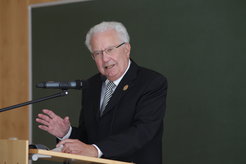Honorary Doctorate for Gerhard Haerendel

Former MPE director Gerhard Haerendel speaks on the occasion of MPE’s 50 anniversary.
Prof. Dr. Gerhard Haerendel studied physics in Tübingen and Munich, receiving his Ph.D. in physics from the University of Munich in 1963. In 1969 he became Fellow of the Max Planck Institute for Physics and Astrophysics and in 1972 Director of the Max Planck Institute for Extraterrestrial Physics (MPE), both in Garching, and retired from the latter at the end of 2000. From 1992 to 1996 he was Director of the MPE’s Außenstelle (external laboratory) in Berlin. In 1987 he was appointed Honorary Professor at the Technical University, Braunschweig. From September 2000 to September 2005 he was Vice-President and Founding Dean of the School of Engineering and Science at the International University Bremen (now Jacobs University). He chaired or presided over several committees on Space Science and Space Research as well as advisory groups during his long-standing affiliation with ESRO and ESA. He was co-founder (1986) and for many years Co-Director of the Skinakas Observatory in Crete.
He has more than 30 years of experience in space research, including the function of Principal Investigator on several international rocket and satellite projects such as PORCUPINE, Coloured Bubbles, AMPTE, CRRES, FREJA, and EQUATOR-S. The sounding rocket work pioneered the application of the barium plasma cloud technique to various aspects of plasma and magnetospheric physics, culminating in the creation of artificial comets in 1984 and 1985. He was one of the fathers of the CLUSTER mission. His theoretical work spans a wide range of topics in space plasma physics. He has 300 publications to his name and memberships of several professional societies and academies. His awards and honours include the Theodore von Karman Award (2002) and the Jean Dominique Cassini Medal (2010).
